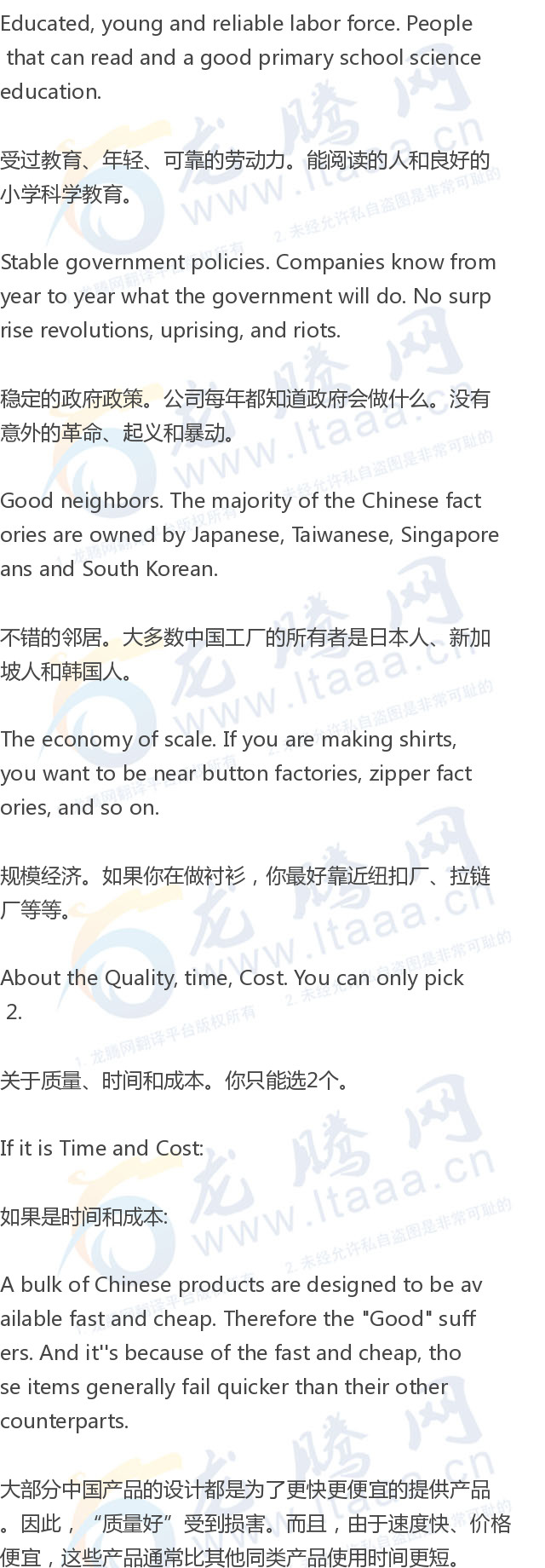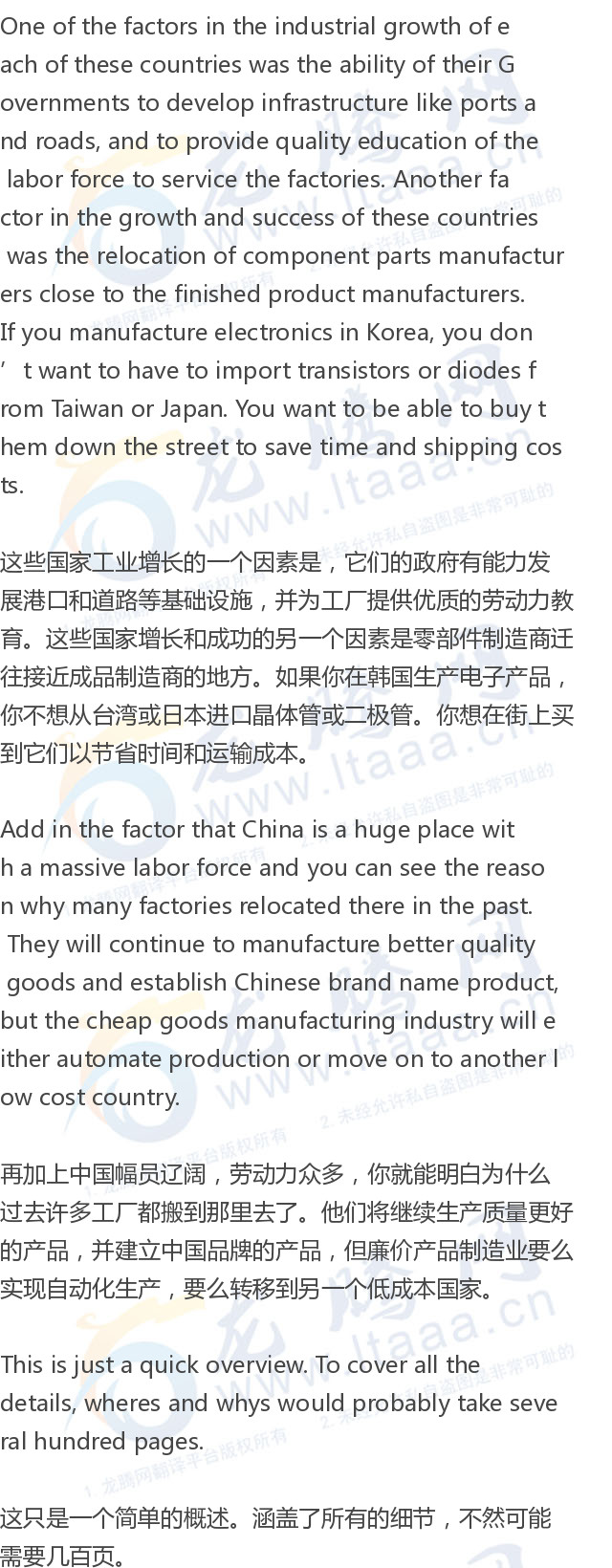 为什么大多数东西都是在中国制造/组装的?
为什么大多数东西都是在中国制造/组装的?
正文翻译
原创翻译:龙腾网 http://www.ltaaa.com 翻译:水滴的思绪 转载请注明出处
Why is most everything made/assembled in China?
为什么大多数东西都是在中国制造/组装的?

图
原创翻译:龙腾网 http://www.ltaaa.com 翻译:水滴的思绪 转载请注明出处
Why is most everything made/assembled in China?
为什么大多数东西都是在中国制造/组装的?

图
评论翻译
原创翻译:龙腾网 http://www.ltaaa.com 翻译:水滴的思绪 转载请注明出处
Aishwariya Ramachandran, Production, Test Design Engineer at Sigma Connectivity (2017-present)
I have been traveling a lot to China for the production of IoT products. This falls on the Engineering triangle. China can produce Quality, Fast, Cheap.
出于其对物联网产品的生产,我经常去中国。这属于项目管理三角形。中国可以高效率地生产质量好、价格便宜的产品。
I feel all the answers about cheaper labor is missing the point of the question. Since the majority of the third world countries have cheaper labor. From most of Africa, South America, India, and so on... Cheap labor has already been pointed out. Here are a few more:
我觉得所有关于廉价劳动力的答案都没有抓住问题的重点。因为大多数第三世界国家的劳动力更便宜。比如非洲大部分地区,南美洲,印度等等…廉价劳动力这一原因已经被指出。这里还有一些其他原因:
Mostly because it has a billion people, about the same as the rest of the developed world combined, but isn''t yet developed enough to be heavy in service industries.
这主要是因为中国有10亿人口,与其他发达国家人口总和大致相当,但还没有发展到服务业占很大比重的程度。
Chinese have been very lucky to get on the industrialization train before cheap automation made that path to development obsolete.
在廉价的自动化技术这条发展道路过时之前,中国人很幸运地坐上了工业化的火车。
China has invested a lot in infrastructure. Factories have reliable power, good highway and rail system to port, and large modern ports.
中国在基础设施方面投入了大量资金。工厂有可靠的电力,还有良好的公路和铁路系统,以及大型现代化港口。

If you pick Quality and Time:
如果选择质量和时间:
China has the capacity for quality items too, the bulk of electronics like Lenovo, Apple products come from China. They are generally high quality and available immediately. But those products are not always "Cheap." Let me ask you this? Do Apple products have this reputation?
中国也有能力生产高质量的产品,像联想、苹果等大部分电子产品都来自中国。他们通常是高质量的,并且可立即获得。但这些产品并不总是“便宜”。我问你?苹果产品有便宜的声誉吗?
China only makes whatever quality someone is willing to pay for. iPhones are made in China but you don''t see people complaining about the build quality on them.
中国只生产人们愿意购买的任何质量的产品。iphone是中国制造的,但你不会看到人们抱怨它们的质量。
Lastly, when you see a product with "made in China" sticker, it''s not all made in China. China usually is the assembly point for most products, the parts come from a wider range of places.
最后,当你看到一个贴着“中国制造”标签的产品时,你会发现它并不全是中国制造。中国通常是大多数产品的装配点,零件来自其它广泛的地方。
Daniel Saad, China Manufacturing experience as a factory GM. www.mentorsclub.net
Originally Answered: why everything is made in China?
原始问题:为什么所有东西都是中国制造的?
You ask why everything is made in China, but you should change that question to, “Why are a lot of items made in China” ? Not everything is made in China. I am going to guess that you are younger than 40 so don’t really have a lot of experience in the progression of the manufacturing industry over time.
你问为什么所有的东西都是中国制造的,但是你应该把这个问题改成,“为什么很多东西都是中国制造的”?不是所有的东西都是中国制造的。我猜你还不到40岁,所以对制造业的发展没有太多经验。
I only go back to the 1950’s so I will start there but the movement of manufacturing goes way back in history. Back in the 1950’s and early 1960’s Japan was the country most well known for being the place to get all your cheap “crap” manufactured. Cheap toys, cheap plastic merchandise. They progressed to manufacturing better quality and value added merchandise until the labor costs priced them out of the cheap goods manufacturing segment. They moved their cheap goods manufacturing to other low labor cost areas like South Korea, Taiwan, and Hong Kong to name just a few. Those countries followed the same trend as Japan and progressed from making cheap goods to manufacturing higher quality value added merchandise. This took place in the 70’s and 80’s. By around 1990 the labor cost in these countries got too expensive and factories began to move to China. And the trend continues. China started out manufacturing cheap goods and has progressed to more technical value added products. Now, as labor costs are increasing in China you will begin to see more factories making cheap goods moving out of China to other low labor cost countries.
我只追溯到20世纪50年代,但制造业的发展可以追溯到很久以前。早在20世纪50年代和60年代初,日本就以制造廉价“垃圾”而闻名。便宜的玩具,便宜的塑料制品。直到劳动力成本把他们挤出了廉价产品的生产环节,他们开始生产质量更好、附加值更高的商品。他们把廉价商品制造转移到其他低劳动力成本地区,如韩国、台湾和香港。这些国家追随与日本相同的趋势,从制造廉价商品发展到制造高质量的增值商品。这发生在70年代和80年代。到1990年左右,这些国家的劳动力成本变得过于昂贵,工厂开始迁往中国。而且这种趋势还在继续。中国开始制造廉价商品,并已发展到更具技术附加值的产品。现在,随着中国劳动力成本的增加,你将开始看到更多生产廉价商品的工厂从中国转移到其他低劳动力成本国家。

Andrew Simms, studied at The University of British Columbia
There are many reasons why firms choose to produce in China
- Massive 1.3 Billion people market to sell "Chinese made" goods to
- Extensive network of infrastructure, ports, roads, airports,rail, huge factories
- Cheap labour cost with better productivity than some other developing countries
- An undervalued currency makes it cheaper for foreign firms to invest/hire
- Economies of scale and the network effect of operating in a global manufacturing hub
企业选择在中国生产的原因有很多
-庞大的13亿人口市场
-基础设施、港口、道路、机场、铁路、大型工厂等形成广泛网络
-劳动力成本低廉,生产率高于其他一些发展中国家
-低估的货币使外国公司投资/雇佣更便宜
-规模经济与全球制造中心运营的网络效应
Jeremy Andrews, researched geopolitics as a hobby for years.
Everyone has tackled the obvious economic explanations, but I would argue that the real reason is actually political. There are plenty of semi-stable countries in the world with low wages, so the real question is out of all of them, why did China get the blessing to become the world’s factory?
每个人都处理了显而易见的经济解释,但我认为真正的原因实际上是政治原因。世界上有很多低工资的半稳定国家,所以真正的问题是,为什么中国能得到成为世界工厂的祝福?
Richard Nixon normalized relations with China in 1972, and this resulted in China opening up to the world (and vice-versa). He primarily intended to drive a wedge between the Soviet unx and China by making overtures to China, and while this policy worked well at first, it established some precedents that later proved harmful. Unlike later presidents and most of the Washington establishment, however, he correctly saw China as a potential threat and likely wouldn’t have given so much ground.
1972年,理查德·尼克松(Richard Nixon)与中国实现关系正常化,这使得中国向世界开放(反之亦然)。他最初的意图是通过向中国示好来离间苏联和中国,虽然这一政策一开始很奏效,但它开始了一些后来被证明是有害的先例。然而,与后来的几任总统和大多数华盛顿当权派不同,他正确地将中国视为一个潜在XX,而且可能不会做出如此大的让步。
Under Jimmy Carter in 1979, the US agreed to withdraw diplomatic relations with Taiwan and establish full diplomatic relations with the PRC. This was largely a continuation of Nixon’s earlier strategy and was, again, primarily targeted at undermining Soviet interests. However, in the process of all this, Deng Xiaoping made a very favorable impression on the American people, most importantly top business executives and politicians. Several agreements were made involving cooperation on military and scientific matters, some of which were obxted to by the Secretaries of Defense and State. Carter trusted the Chinese a bit more than he should have, arguably, but Deng was just too charismatic.
1979年,在吉米·卡特(Jimmy Carter)的领导下,美国同意撤销与台湾的外交关系,与中华人民共和国建立全面外交关系。这在很大程度上是尼克松早期战略的延续,也是为了破坏苏联的利益。然而,在这一过程中,当时的中国给美国人民留下了非常好的印象,最重要的是给商界高层和政界人士留下了非常好的印象。几项协议涉及军事和科学方面的合作,其中一些遭到了国防部长和国务卿的反对。可以说,卡特对中国的信任超过了他应该有的程度。

Without that event, China’s rise as the world’s factory seems a lot less inevitable. Without the US manufacturers moving to China, and without such easy access to the American market, supply chains simply never would have been arranged the way they were. Outsourcing might still happen of course, but it’s likely that a different nation or nations would have become the world’s factory. Globalization may have been inevitable, but China becoming the world’s factory was far from inevitable.
如果没有这一事件,中国崛起为世界工厂似乎就不那么不可避免了。如果没有美国制造商转移到中国,如果没有如此容易进入美国市场,供应链根本就不会以现在的方式安排。当然,外包仍有可能发生,但是很可能一个或多个不同的国家会成为世界的工厂。全球化或许是不可避免的,但中国成为世界工厂远非不可避免。
原创翻译:龙腾网 http://www.ltaaa.com 翻译:水滴的思绪 转载请注明出处
Aishwariya Ramachandran, Production, Test Design Engineer at Sigma Connectivity (2017-present)
I have been traveling a lot to China for the production of IoT products. This falls on the Engineering triangle. China can produce Quality, Fast, Cheap.
出于其对物联网产品的生产,我经常去中国。这属于项目管理三角形。中国可以高效率地生产质量好、价格便宜的产品。
I feel all the answers about cheaper labor is missing the point of the question. Since the majority of the third world countries have cheaper labor. From most of Africa, South America, India, and so on... Cheap labor has already been pointed out. Here are a few more:
我觉得所有关于廉价劳动力的答案都没有抓住问题的重点。因为大多数第三世界国家的劳动力更便宜。比如非洲大部分地区,南美洲,印度等等…廉价劳动力这一原因已经被指出。这里还有一些其他原因:
Mostly because it has a billion people, about the same as the rest of the developed world combined, but isn''t yet developed enough to be heavy in service industries.
这主要是因为中国有10亿人口,与其他发达国家人口总和大致相当,但还没有发展到服务业占很大比重的程度。
Chinese have been very lucky to get on the industrialization train before cheap automation made that path to development obsolete.
在廉价的自动化技术这条发展道路过时之前,中国人很幸运地坐上了工业化的火车。
China has invested a lot in infrastructure. Factories have reliable power, good highway and rail system to port, and large modern ports.
中国在基础设施方面投入了大量资金。工厂有可靠的电力,还有良好的公路和铁路系统,以及大型现代化港口。

If you pick Quality and Time:
如果选择质量和时间:
China has the capacity for quality items too, the bulk of electronics like Lenovo, Apple products come from China. They are generally high quality and available immediately. But those products are not always "Cheap." Let me ask you this? Do Apple products have this reputation?
中国也有能力生产高质量的产品,像联想、苹果等大部分电子产品都来自中国。他们通常是高质量的,并且可立即获得。但这些产品并不总是“便宜”。我问你?苹果产品有便宜的声誉吗?
China only makes whatever quality someone is willing to pay for. iPhones are made in China but you don''t see people complaining about the build quality on them.
中国只生产人们愿意购买的任何质量的产品。iphone是中国制造的,但你不会看到人们抱怨它们的质量。
Lastly, when you see a product with "made in China" sticker, it''s not all made in China. China usually is the assembly point for most products, the parts come from a wider range of places.
最后,当你看到一个贴着“中国制造”标签的产品时,你会发现它并不全是中国制造。中国通常是大多数产品的装配点,零件来自其它广泛的地方。
Daniel Saad, China Manufacturing experience as a factory GM. www.mentorsclub.net
Originally Answered: why everything is made in China?
原始问题:为什么所有东西都是中国制造的?
You ask why everything is made in China, but you should change that question to, “Why are a lot of items made in China” ? Not everything is made in China. I am going to guess that you are younger than 40 so don’t really have a lot of experience in the progression of the manufacturing industry over time.
你问为什么所有的东西都是中国制造的,但是你应该把这个问题改成,“为什么很多东西都是中国制造的”?不是所有的东西都是中国制造的。我猜你还不到40岁,所以对制造业的发展没有太多经验。
I only go back to the 1950’s so I will start there but the movement of manufacturing goes way back in history. Back in the 1950’s and early 1960’s Japan was the country most well known for being the place to get all your cheap “crap” manufactured. Cheap toys, cheap plastic merchandise. They progressed to manufacturing better quality and value added merchandise until the labor costs priced them out of the cheap goods manufacturing segment. They moved their cheap goods manufacturing to other low labor cost areas like South Korea, Taiwan, and Hong Kong to name just a few. Those countries followed the same trend as Japan and progressed from making cheap goods to manufacturing higher quality value added merchandise. This took place in the 70’s and 80’s. By around 1990 the labor cost in these countries got too expensive and factories began to move to China. And the trend continues. China started out manufacturing cheap goods and has progressed to more technical value added products. Now, as labor costs are increasing in China you will begin to see more factories making cheap goods moving out of China to other low labor cost countries.
我只追溯到20世纪50年代,但制造业的发展可以追溯到很久以前。早在20世纪50年代和60年代初,日本就以制造廉价“垃圾”而闻名。便宜的玩具,便宜的塑料制品。直到劳动力成本把他们挤出了廉价产品的生产环节,他们开始生产质量更好、附加值更高的商品。他们把廉价商品制造转移到其他低劳动力成本地区,如韩国、台湾和香港。这些国家追随与日本相同的趋势,从制造廉价商品发展到制造高质量的增值商品。这发生在70年代和80年代。到1990年左右,这些国家的劳动力成本变得过于昂贵,工厂开始迁往中国。而且这种趋势还在继续。中国开始制造廉价商品,并已发展到更具技术附加值的产品。现在,随着中国劳动力成本的增加,你将开始看到更多生产廉价商品的工厂从中国转移到其他低劳动力成本国家。

Andrew Simms, studied at The University of British Columbia
There are many reasons why firms choose to produce in China
- Massive 1.3 Billion people market to sell "Chinese made" goods to
- Extensive network of infrastructure, ports, roads, airports,rail, huge factories
- Cheap labour cost with better productivity than some other developing countries
- An undervalued currency makes it cheaper for foreign firms to invest/hire
- Economies of scale and the network effect of operating in a global manufacturing hub
企业选择在中国生产的原因有很多
-庞大的13亿人口市场
-基础设施、港口、道路、机场、铁路、大型工厂等形成广泛网络
-劳动力成本低廉,生产率高于其他一些发展中国家
-低估的货币使外国公司投资/雇佣更便宜
-规模经济与全球制造中心运营的网络效应
Jeremy Andrews, researched geopolitics as a hobby for years.
Everyone has tackled the obvious economic explanations, but I would argue that the real reason is actually political. There are plenty of semi-stable countries in the world with low wages, so the real question is out of all of them, why did China get the blessing to become the world’s factory?
每个人都处理了显而易见的经济解释,但我认为真正的原因实际上是政治原因。世界上有很多低工资的半稳定国家,所以真正的问题是,为什么中国能得到成为世界工厂的祝福?
Richard Nixon normalized relations with China in 1972, and this resulted in China opening up to the world (and vice-versa). He primarily intended to drive a wedge between the Soviet unx and China by making overtures to China, and while this policy worked well at first, it established some precedents that later proved harmful. Unlike later presidents and most of the Washington establishment, however, he correctly saw China as a potential threat and likely wouldn’t have given so much ground.
1972年,理查德·尼克松(Richard Nixon)与中国实现关系正常化,这使得中国向世界开放(反之亦然)。他最初的意图是通过向中国示好来离间苏联和中国,虽然这一政策一开始很奏效,但它开始了一些后来被证明是有害的先例。然而,与后来的几任总统和大多数华盛顿当权派不同,他正确地将中国视为一个潜在XX,而且可能不会做出如此大的让步。
Under Jimmy Carter in 1979, the US agreed to withdraw diplomatic relations with Taiwan and establish full diplomatic relations with the PRC. This was largely a continuation of Nixon’s earlier strategy and was, again, primarily targeted at undermining Soviet interests. However, in the process of all this, Deng Xiaoping made a very favorable impression on the American people, most importantly top business executives and politicians. Several agreements were made involving cooperation on military and scientific matters, some of which were obxted to by the Secretaries of Defense and State. Carter trusted the Chinese a bit more than he should have, arguably, but Deng was just too charismatic.
1979年,在吉米·卡特(Jimmy Carter)的领导下,美国同意撤销与台湾的外交关系,与中华人民共和国建立全面外交关系。这在很大程度上是尼克松早期战略的延续,也是为了破坏苏联的利益。然而,在这一过程中,当时的中国给美国人民留下了非常好的印象,最重要的是给商界高层和政界人士留下了非常好的印象。几项协议涉及军事和科学方面的合作,其中一些遭到了国防部长和国务卿的反对。可以说,卡特对中国的信任超过了他应该有的程度。

Without that event, China’s rise as the world’s factory seems a lot less inevitable. Without the US manufacturers moving to China, and without such easy access to the American market, supply chains simply never would have been arranged the way they were. Outsourcing might still happen of course, but it’s likely that a different nation or nations would have become the world’s factory. Globalization may have been inevitable, but China becoming the world’s factory was far from inevitable.
如果没有这一事件,中国崛起为世界工厂似乎就不那么不可避免了。如果没有美国制造商转移到中国,如果没有如此容易进入美国市场,供应链根本就不会以现在的方式安排。当然,外包仍有可能发生,但是很可能一个或多个不同的国家会成为世界的工厂。全球化或许是不可避免的,但中国成为世界工厂远非不可避免。
很赞 1
收藏